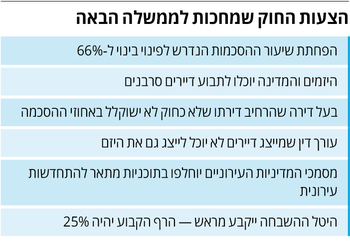The Marker, Adi Cohen, Gili Melnitsky, 04.01.2021
"The consequences of the government stalemate are fatal, and in my estimation as soon as the corona ends we will find ourselves at the threshold of a new housing crisis" - warns Deputy Attorney General Erez Kaminitz in a conversation with TheMarker.
The real estate industry is currently facing an economic crisis, a shortage of housing supply and black forecasts for rising housing prices. These are now joining the government paralysis and the upcoming elections, which are expected to deepen problems in the industry and leave major reforms in the drawer.
One of the reforms that the market is waiting for is to reduce the consent rate in evacuation-construction projects from 80% today to only about 66% in the future, as part of what the Ministry of Justice calls "the fight against extortionate tenants." Tenants who have committed construction offenses in their apartment will not be weighed in the calculation at all. This step is intended to facilitate the realization of the projects, and is expected to bring about no small revolution.
As part of the reform, legislative amendments stipulate that a construction eviction appraiser appointed by the Urban Renewal Authority will decide whether a tenant's refusal to a project is reasonable or not. In cases of unreasonable refusal, both the state and the developer will be able to sue the tenant. In doing so, the state seeks to mark its position in relation to tenants who take advantage of the need to obtain their consent in order to receive higher returns for their apartment - thus delaying and thwarting projects.
The reform also seeks to increase planning certainty in the urban renewal industry, which has suffered from chronic uncertainty for many years - and to replace municipal policy documents with comprehensive outline plans. The move means limiting the power of mayors to make changes to planning policy in their area. This is in view of the many cases in which they changed the policy without notice, or situations in which the municipal policy changed after the change of government in the local authority.

Further legislative amendments to the reform address dramatic issues for the market and the entrepreneurs operating in it. For example, the tariff for the improvement levy that will be charged for the renewal projects will become uniform - and will be 25% for all local authorities throughout the country.
Kaminitz says in this context that "apart from the reform of urban renewal, other important moves that are waiting on our table for a long time and will require a quick response with the formation of the new government are: the plan to remove barriers to planning and construction in Arab society. The domain of purchasing groups.
"With the formation of the new government we will have to act as quickly as possible, in order to close the gap in the ability to deal with a real, impending housing crisis. In the last two years political stagnation has created significant difficulty in reforming the public in Israel." "In the meantime, the political crisis has created a situation of lack of orderly decision-making and a lack of a work plan that will pave the way for the various government ministries. Meanwhile, the wheels are not moving, the plans are not crystallizing - and the apartments will certainly not be built on their own."
In recent years, in view of the land shortage in Israel and the forecasts of demographic growth, the field of urban renewal has been marked as an urgent national task. From the target set by the government for the construction of about 1.5 million apartments by 2040, it was determined that close to half of the construction (46%) will be promoted as part of urban renewal projects. However, the implementation of the vision has meanwhile been hampered by a long line of bureaucratic barriers, greed by developers and apartment owners, and overall uncertainty - caused by frequent policy changes over which the heads of local authorities are winning.



